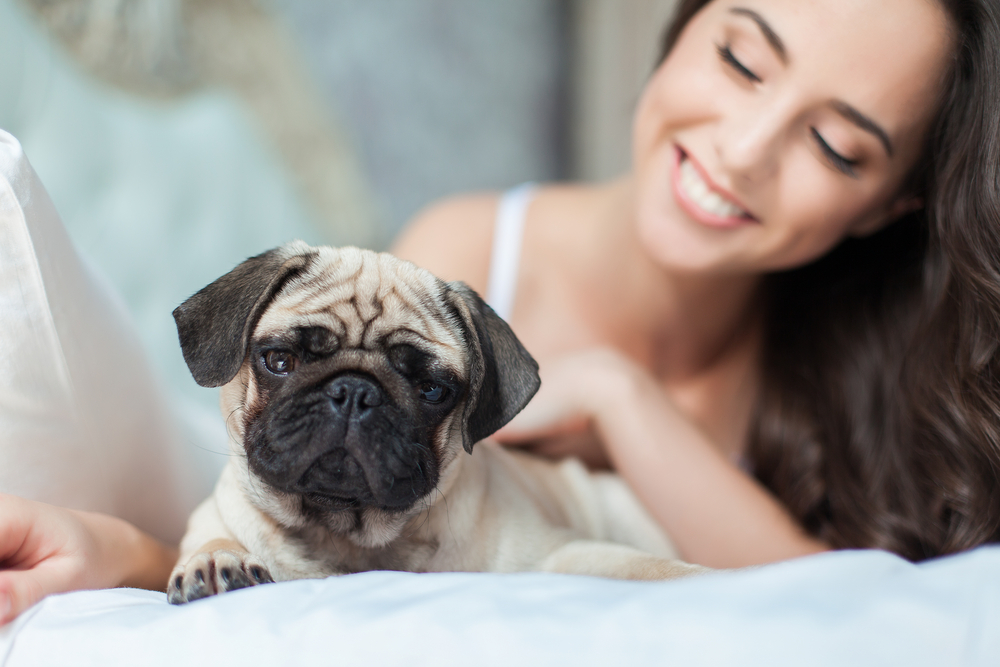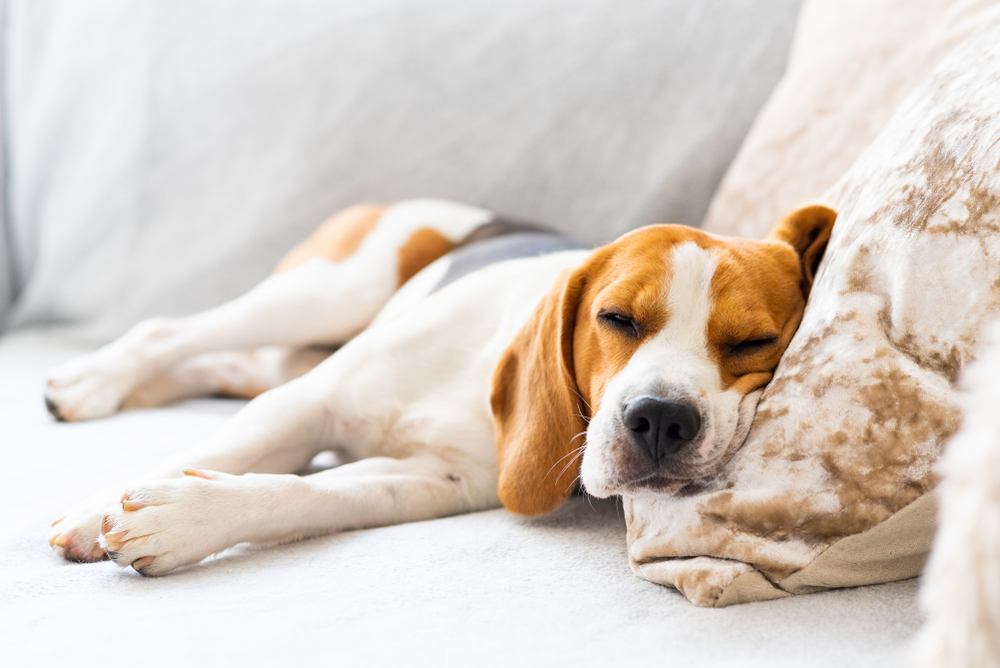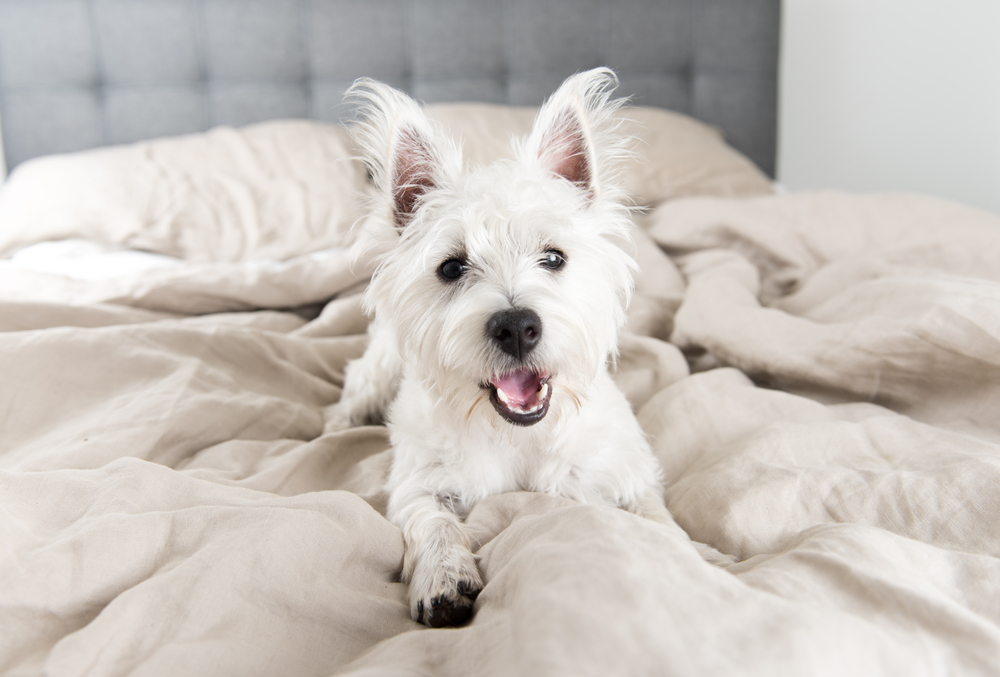Our dogs are there on our morning walks. They’re by our side in the kitchen, watching as we cook up new culinary creations. And if it’s time for a TV marathon, you can bet our they’re sitting next to us on the sofa, too. In truth, our canine companions do an amazing job at keeping us company no matter where we go.
But there’s one place, in particular, that you might wonder about sharing—your bed.
In truth, there’s no straight answer to whether sharing your bed with a dog is a good idea. If your pup has anxiety, CBD for dogs is a possible solution to ease their worries. However, by understanding the benefits, the potential problems, and how to keep yourself and your pup comfy, you can ensure better sleep for both you and your furry friend.
Benefits of Sharing a Bed With Your Dog
Wondering, should I let my dog sleep with me? There’s plenty of evidence to show how much a dog’s presence can benefit our sleep. And taking a closer look at the science can help us understand just how much of a dream it can be.
#1 You’re Likely to Sleep Just as Soundly
It’s natural to wonder if sharing your bed might have you tossing and turning, but the science tells us there’s little cause for concern. Research has found that people who share a sleeping space with their dogs may achieve even better sleep.1
Here’s how the study worked:
- Both humans and their dogs wore sleep-tracking devices while sharing a bed for seven days.
- After the study, scientists evaluated the data from the sleep trackers.
- They found that the humans had an 81% sleep efficiency, while the dogs had an 85% sleep efficiency.
For reference, a sleep efficiency score measures the amount of time a person (or in this case, a dog) spends asleep while in bed. In the study above, both humans and their pups spent a majority of their bedtime asleep—a good sign for your slumber all around.
#2 Your Pup’s Presence Could Provide Safety and Security
If you tend to worry about every creak or bump in the night as you drift off each evening, sleeping with your dog nearby may help you feel more safe and secure.
A recent study examined how sharing a bed with a pet impacted the sleep quality of adult women.2 Overall, the study found that women who shared their beds with dogs felt an increased sense of comfort, compared to those who did not have a canine companion nearby.
Much like you worry over your pet’s health, our dogs also care for our well-being. And when it comes to bedtime, that concern could give dog owners an added sense of security.
Those feelings of security aren’t without reason, either.
Another study found that many dogs will instinctively try to rescue or protect their owners and even pick up on their signs of distress—day and night.3

#3 Having a Dog Nearby Can Reduce Stress
If you find it a challenge to settle down after a long, stressful day, having a pup snuggled up beside you could help here, too. Multiple studies have shown that co-sleeping with a dog can have several positive health effects, including:
- Reducing your blood pressure4
- Lowering your stress hormones5
- Reducing your heart rate
- Releasing oxytocin
Each of these effects can benefit your sleep, but the last one may be especially important. Sometimes known as the “love hormone,” oxytocin can help to regulate your mood, reduce stress, and naturally promote better sleep.
#4 Your Dog May Sleep Better, Too
Some dog owners may wonder if sharing a bed with their pup could impact their pet’s sleep, in addition to their own. While it’s a good question to ask, there’s little evidence to suggest that a dog’s sleep suffers when they’re at our side.
The sleep efficiency study mentioned above helps to show that our dogs can get plenty of quality rest when sharing our bed. In addition, research has found that dogs experience less stress and anxiety when they’re around their humans.6
While the study didn’t cover co-sleeping specifically, it’s easy to imagine that the relaxation your dog experiences from your presence might extend to their sleep. So, the next time you snuggle up with your pup and feel all the cozy comfort wash over you, don’t stress about your dog’s shut-eye. Chances are, they sleep even better next to you, too.
When Sharing a Bed With Your Dog Might Cause Problems
If you find yourself laying in bed after a restless night and wondering, is it bad to let your dog sleep with you? don’t worry—you’re probably not the first. Benefits aside, there are several situations where sleeping with your dog might prevent you from catching those ZZZs.
Here are a few situations that might make a restful sleep a little more elusive when sharing a bed with your dog:
- You’re allergic to dogs
- Your bed is too small to share with your dog
- You overheat easily
- You’re a light sleeper (and your dog has active dreams)
- Your dog has behavioral problems
- One of you is sick, injured, or recovering from surgery
If these or any other issues are causing you extra stress at bedtime, it might be worth taking a step back and considering how you can solve the problem. In some situations, the solution might require giving yourself and your dog a little space—but that isn’t always the case.
Sometimes, all you need for better sleep are a few tips and tricks to take the snags out of your bed-sharing experience.

Tips to Help You And Your Dog Sleep Side-By-Side
Perhaps you’re already enjoying the benefits of sharing your bed with a furry friend and just want to make the experience even sweeter. Sometimes, however, you might need to adjust a few things to ensure both you and your pup are as comfortable as can be.
In either case, these tips can help to smooth out a few of the most common bedtime wrinkles, to help ensure both you and the pooch get plenty of rest.
#1 Make Bathtime a Priority Before Sharing a Bed
The joy your dog receives from splashing in puddles and rolling in the dirt might be part of why you love them so much. But before they jump into bed with you, make sure they’re all cleaned up. This can help you save your sheets from muddy pawprints and ensure a cleaner sleep environment.
Here’s a quick and easy bedtime routine to keep your dog clean:
- Gently wipe your dog’s paws with a damp cloth after trips outside
- Towel off any dirt or mud on the rest of their body with a washcloth
These tips can help with cleanliness on a daily basis. If you experience any dog allergies, however, you might want to make full-on baths part of your weekly routine, too.
Some pet professionals suggest that giving your dog weekly baths can help reduce dead skin cells and pet dander.7 This, in turn, could potentially help you wake up with fewer sniffles in the morning.
#2 Sleep In a Bed with Plenty of Space
Fitting yourself and a tiny, adorable puppy on a small bed may not be an issue at the beginning. But if you’re the proud owner of a Great Dane or another oversized breed, space limitations can present problems as they grow.
If you find yourself and your pup constantly struggling to fit in the same bed, it could prevent you from sleeping as soundly.
As such, if you plan to share a bed with your pup for the long run, the best solution might be to buy a bigger bed. In the meantime, however, you can find more comfort by establishing some boundaries—like having your dog sleep at your feet, rather than by your side.
If you’re still struggling to find enough room, you can regain your bed space but still keep your dog close by providing a comfortable dog bed right alongside yours.
#3 Take Care of Any Behavioral Issues
If your dog tends to become protective of their territory or tear up your blankets, it might be a sign that sharing your bed won’t work so well. These behavioral issues don’t necessarily mean your dog can never sleep in your bed. In some cases, however, it may be better to address your dog’s behavior before sharing your sleeping space. Pay close attention to their dog tail meaning to see if you can determine the cause of their upset.
Other signs your dog might interrupt, rather than help, your sleep include:
- If they tend to wiggle around in bed
- If they bark or growl at small noises
- If they wake you up earlier than you wish
Sometimes dogs have too much energy built up from lounging around all day to settle. You can use dog enrichment ideas to keep your canine engaged and active before bedtime.
If your dog often becomes anxious and wakes you up at night or seems to have trouble settling down, try giving them a few drops of CBD hemp oil for dogs or a CBD dog treat before bed. This supplement may help to soothe their worried thoughts, allowing both of you to sleep more restfully.
Canna-Pet: The Calm Before the Snore
Cozying up next to your snoring pup at the end of the day can provide worlds of comfort. However, if you’re new to sharing your bed with a dog, don’t worry if it takes some time to get used to it. Once you’ve settled into your new routine, chances are both you and your pet will be waking up more refreshed than ever.
In some cases, however, your dog might need some extra support—like when the bedtime jitters keep them awake or discomfort prevents them from getting comfortable.
That’s where Canna-Pet comes in. Recommended by veterinarians and pet owners alike, our array of products that offer CBD for pets may help to support your dog’s wellness, soothe their worried feelings, and promote healthy, restful sleep.
To give your pup a pawsitively relaxing sleep, choose Canna-Pet.
Sources:
- Mayo Clinic Proceedings. The Effect of Dogs on Human Sleep in the Home Sleep Environment. https://www.mayoclinicproceedings.org/article/S0025-6196(17)30486-X/fulltext
- Taylor & Francis Online. An Examination of Adult Women’s Sleep Quality and Sleep Routines in Relation to Pet Ownership and Bedsharing. https://www.tandfonline.com/doi/abs/10.1080/08927936.2018.1529354
- PLOS One. Pet dogs (Canis lupus familiaris) release their trapped and distressed owners: Individual variation and evidence of emotional contagion https://journals.plos.org/plosone/article?id=10.1371/journal.pone.0231742
- PubMed. Cardiovascular effects of human-pet dog interactions. https://pubmed.ncbi.nlm.nih.gov/3236382/
- Frontiers in Psychology. Psychosocial and Psychophysiological Effects of Human-Animal Interactions: The Possible Role of Oxytocin. https://www.frontiersin.org/articles/10.3389/fpsyg.2012.00234/full
- ScienceDirect. Behavioral and physiological reactions in dogs to a veterinary examination: Owner-dog interactions improve canine well-being. https://www.sciencedirect.com/science/article/abs/pii/S0031938417301403?via%3Dihub
- The Humane Society of the United States. How to live with allergies and pets. https://www.humanesociety.org/resources/how-live-allergies-and-pets




